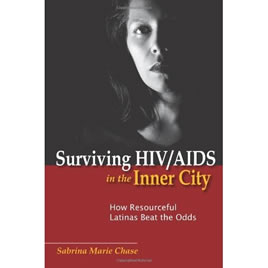Jennifer Forbes
Communications & Public Affairs
732-235-6356, jenn.forbes@umdnj.edu
New Book Highlights Struggles of HIV-positive Latina Women in Newark

Sabrina M. Chase, PhD, an anthropologist and research analyst in Family Medicine, has published Surviving HIV/AIDS in the Inner City, which explores the survival strategies of poor, HIV-positive Puerto Rican women. Based on her work with minority women living in Newark, NJ, Dr. Chase highlights the difficulties Latinas face negotiating the health care system and through moving, personal stories, explains how some women struggle with survival, while others flourish even under the most difficult of situations.
“Dr. Chase has published an exceptional book that relates very moving stories of HIV-positive Latina women coping with a multitude of stresses as a result of their disease,” said Alfred Tallia, MD, MPH, professor and chair, department of Family Medicine and Community Health. “It is also demonstrates the work of our researchers as meaningful, timely and relevant to our society’s most difficult health problems.”
According to the book’s description, Surviving HIV/AIDS in the Inner City investigates survival strategies of living with the disease by asking four key questions: Given their limited resources, how did the women manage an illness as serious as HIV/AIDS? Did they look for alternatives to conventional medical treatment? Did the challenges they faced deprive them of self determination, or could they help themselves and each other? What can we learn from these resourceful women? These gripping, true-life stories advocate for those living with chronic illness who depend on the health care “safety net.” Through her exploration of life and death among Newark’s resourceful women, Chase provides the groundwork for inciting positive change in the U.S. health care system.
The book draws on the work of multiple faculty members from the Department of Family Medicine and Community Health at Robert Wood Johnson Medical School. The chapter, “Working the Clinics” on women’s use of the health care system utilizes former faculty member, Dr. John Scott's research on healing relationships to analyze the range of doctor-patient collaborations Dr. Chase observed. “Learning from Resourceful Women” points to Dr. Jeanne Ferrante's, professor, work with patient navigators, noting its promise for improving outcomes among urban, chronically-ill women. Finally, Dr. Chase cited Dr. Benjamin Crabtree's, professor and director of the department’s research division, recent publications on the PCMH National Demonstration Project in exploring how we might improve primary care for women and men living with chronic illness.
Dr. Chase is a medical anthropologist specializing in women's health, racial and ethnic health care disparities and the anthropology of the body. She earned her doctorate from Rutgers University, following which she completed a Primary Care/Health Services Research Fellowship at UMDNJ-Robert Wood Johnson Medical School. Surviving HIV/AIDS in the Inner City: How Resourceful Latinas Beat the Odds, is available through the Rutgers University Press.
About UMDNJ-ROBERT WOOD JOHNSON MEDICAL SCHOOL
As one of the nation’s leading comprehensive medical schools, UMDNJ-Robert Wood Johnson Medical School is dedicated to the pursuit of excellence in education, research, health care delivery, and the promotion of community health. In cooperation with Robert Wood Johnson University Hospital, the medical school’s principal affiliate, they comprise New Jersey’s premier academic medical center. In addition, Robert Wood Johnson Medical School has 34 other hospital affiliates and ambulatory care sites throughout the region.
As one of the eight schools of the University of Medicine and Dentistry of New Jersey with 2,800 full-time and volunteer faculty, Robert Wood Johnson Medical School encompasses 22 basic science and clinical departments, hosts centers and institutes including The Cancer Institute of New Jersey, the Child Health Institute of New Jersey, the Center for Advanced Biotechnology and Medicine, the Environmental and Occupational Health Sciences Institute, and the Stem Cell Institute of New Jersey. The medical school maintains educational programs at the undergraduate, graduate and postgraduate levels for more than 1,500 students on its campuses in New Brunswick, Piscataway, and Camden, and provides continuing education courses for health care professionals and community education programs. To learn more about UMDNJ-Robert Wood Johnson Medical School, log on to rwjms.umdnj.edu. Find us online at www.Facebook.com/RWJMS and www.twitter.com/UMDNJ_RWJMS.
###


 Back to News Releases
Back to News Releases

